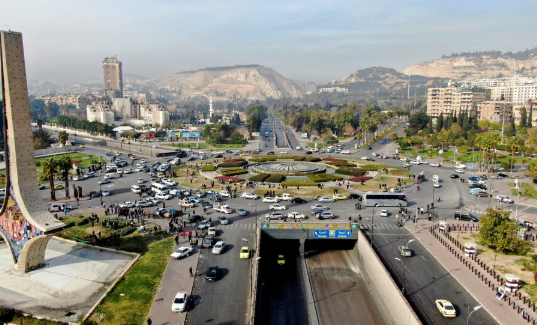Damascus Governorate is considered the beating heart and historical and cultural soul of Syria. It's the smallest of the country's governorates by area, yet it's the most important and influential politically, culturally, and socially. Spanning no more than 105 square kilometers, Damascus embraces one of the oldest continuously inhabited cities in the world, with a history stretching back more than 11,000 years.
1. Historical and Civilizational Overview
Damascus is not only the current capital of Syria but also one of the world's oldest cities that has continuously been inhabited and developed throughout the ages. The earliest settlements in Damascus date back to the Neolithic period, and it passed through multiple civilizations: the Phoenicians, Arameans, Greeks, Romans, and Byzantines. It then came under Islamic rule in the 7th century CE, where it became the center of the Umayyad Caliphate, giving it a prestigious religious and political status.
During the Umayyad Caliphate (661–750 CE), Damascus experienced tremendous prosperity. The Great Umayyad Mosque was built there, which is one of the most magnificent Islamic landmarks and one of the oldest mosques in the world, reflecting the depth of the city's urban and artistic heritage. The city also lived under the rule of the Abbasids, Mamluks, and Ottomans, playing a major role in Islamic and Arab history, in addition to its influence on the region's cultural and political history.
2. What is Damascus Known For?
- The political and administrative capital of Syria, housing government headquarters, the presidency, and parliament.
- A cultural and artistic center that includes theaters, museums, and cultural centers reflecting the richness of Syrian heritage.
- The Old City with its archaeological buildings and traditional markets that tell a story of ancient history, such as Al-Hamidiyah Souk and traditional bathhouses.
- Authentic Damascene cuisine such as Kibbeh, Fattoush, Shawarma, and popular dishes that reflect the city's diverse heritage.
- The Great Umayyad Mosque, considered an Islamic architectural masterpiece that attracts visitors from all over the world.
3. Key Tourist and Historical Landmarks
- The Great Umayyad Mosque: One of the most important mosques in the Islamic world, famous for its architectural art and magnificent decorations.
- The Old City: Surrounded by historical walls and ancient citadels, it contains intertwined alleys and markets that preserve its traditional character.
- Damascus Citadel and the gates of the Old City like Bab Touma and Bab Sharqi.
- Museums: Such as the National Museum, which houses archaeological artifacts from various Syrian eras.
- Historical churches and mosques: Reflecting the city's religious and ethnic diversity.
4. Geography and Climate
Damascus is located in a fertile valley surrounded by mountains from several sides, which largely gives it a moderate climate, with hot and dry summers and mild, rainy winters. It's nourished by small rivers like the Barada River, which flows through the city, lending it natural beauty and irrigating the surrounding agricultural lands. This unique geographical location has helped the city remain a civilizational center throughout the ages.
5. Culture and Customs
Damascus represents a melting pot of cultures, inhabited by people of different sects, including Sunni and Shiite Muslims, Christians, and many other minorities. It is famous for its cultural and artistic festivals held throughout the year, combining traditional and modern arts. Folk customs and traditions such as religious celebrations, weddings, and social events represent a living heritage that is still passionately preserved.
6. Economic Activities
Damascus is a vital economic center, encompassing diverse sectors including light industry, trade, and services. Traditional and modern commercial markets are widespread, and it houses many companies and financial institutions. Despite challenges, tourism remains an important economic resource, especially given the city's rich history and cultural heritage.
7. Administrative Organization
Damascus Governorate is an independent administrative unit from Rural Damascus, encompassing only the city itself, making it geographically small but immensely impactful. It's divided into several directorates and neighborhoods that include important residential and commercial centers.
8. Infrastructure and Services
Damascus boasts a developed transportation network including major roads, buses, and public transport. It contains numerous advanced hospitals and health centers, as well as prestigious universities like Damascus University. It also houses various cultural and educational centers, with theaters, exhibition halls, and public libraries.

